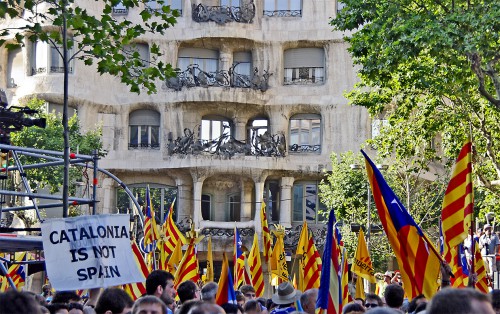By Alexa Gagosz
The Catalans protest against the nation that has basically owned them for years saying, “Catalonia is not Spain,” as their argument.
Catalonia used to be an independent region, part of the Iberian peninsula, which is now modern-day Spain and Portugal, since the ninth century. Before Spain took its people under its fist of power, the Catalan people had their own laws, language, and traditions. Under the reign of King Philip V, the War of the Spanish Succession ended with the Catalan defeat in 1714, according to the The Telegraph.
Kings following Philip V attempted to impose the Spanish language and laws, but the region resisted, and Spain gave up all attempts in 1931, when they moved to the Generalitat, which is the Catalonian governmental system, according to The Telegraph.
General Francisco Franco set out to destroy the Catalan separatism when he won the Battle of Ebro in 1938, killing more than 3,500 people and sending numerous more into exile. The region was given another chance and turned back over to democracy in 1977. From then until July 2010, calls have been made for independence, according to reports from The Telegraph.

When the Constitutional Court in Madrid overruled the 2006 autonomy, they said there was no legal basis for recognizing Catalonia as a nation within Spain. Due to reports from The Telegraph, the wealthy Barcelona region, which is part of Catalonia, has been aiding the poorer Spain economy for years, making the Spanish government refuse the calls for independence.
The Catalan region has always been the industrial heartland of Spain, first for its maritime power and trading goods, but now for hi-tech companies, services, and finance. According to reports from The Telegraph, secession would cost Spain 20 percent toward economic output and also make them figure out the sovereign’s 836 billion euros of debt.
Unfortunately for Catalonia, according to calculations done by the Organization for Economic Co-operation and Development, their contribution to the Spanish economy is twice that of Scotland’s contribution to the U.K.
On Nov. 9, Catalans are due to vote toward independence, although the vote was canceled by the Constitutional Court after Prime Minister Mariano Rajoy’s conservative government filed a challenge, according to France24.
Although, according to DW Akademie, the vote is unofficial and non-binding, yet Madrid still claims that the entire process is illegal. This resistance from Madrid has done nothing more than encourage Catalans to push toward independence.
Artur Mas, Catalan politician now running for Prime Minister, said there is little that he can do, but said to Der Spiegel, “I will 100 percent call the referendum.” He plans to present a law in the Catalan parliament to provide the framework of holding the referendum in complete legality. According to Der Spiegel, Mas wants to hold the referendum on Nov. 9, even if Madrid completely opposes and prohibits the idea.
Joachim Coll, a resolute opponent of Catalan independence who lives on the edge of the Barcelona old town, believes that secession of his very homeland cannot be defended politically or morally. He states to Der Spiegel, “In a constitutional democracy, there is no right to self-rule or to secession from the state as a whole.”
Coll believes that Catalonia, which is Spain’s wealthiest region, is showing a lack of solidarity for the rest of the country and added to Der Spiegel, “You can’t be both leftist and nationalist.”
A fellow independence opponent Jacinto Solet Padró, a business lawyer, states to Der Spiegel, “We want to be Catalans, but we don’t want to dispense with Spain.”







